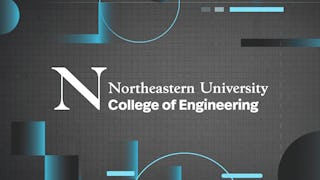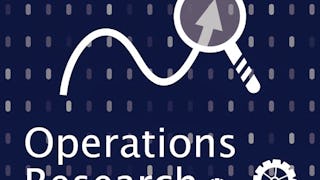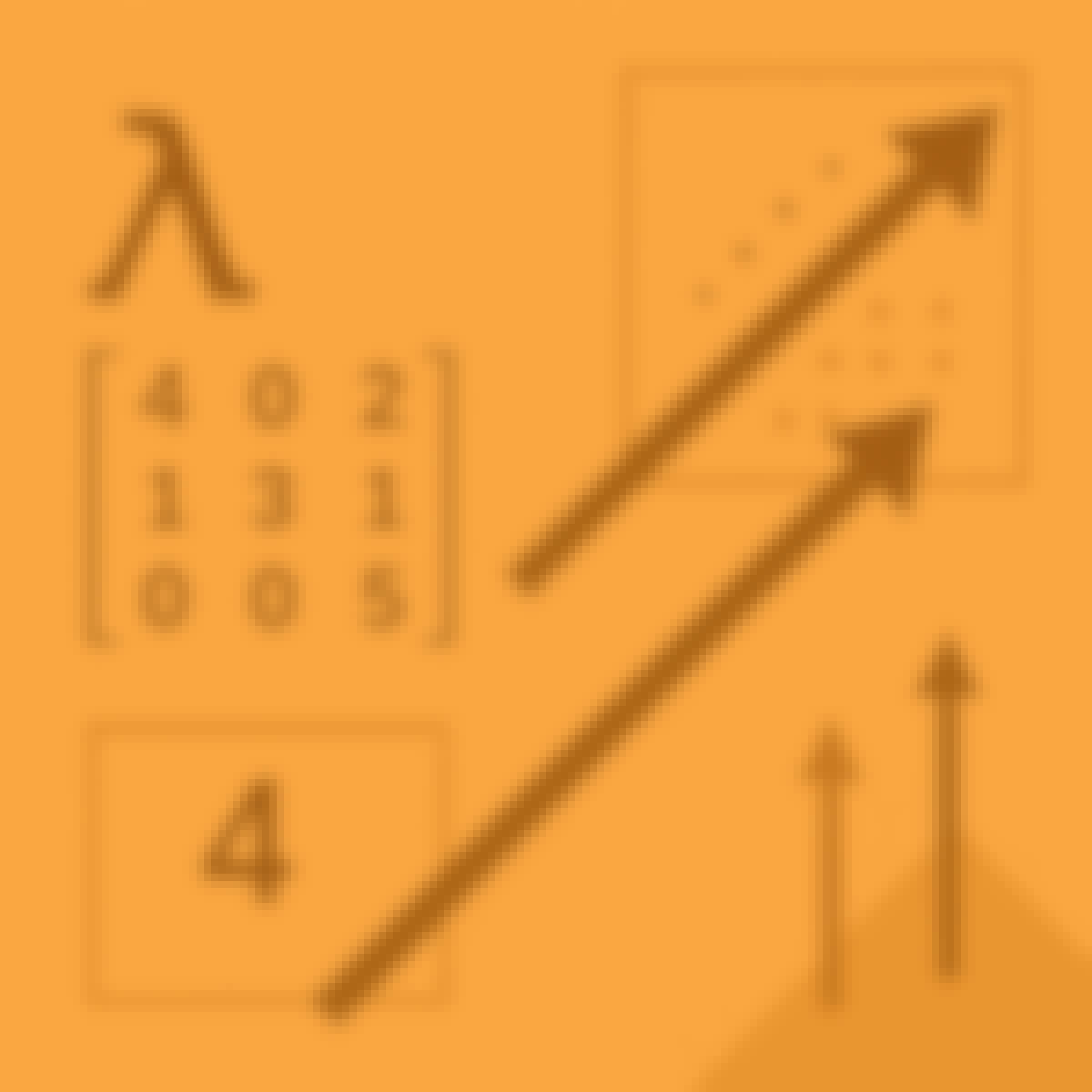- Browse
- Linear Programming
Linear Programming Courses
Linear programming courses can help you learn optimization techniques, constraint handling, and objective function formulation. You can build skills in sensitivity analysis, duality theory, and graphical methods for problem-solving. Many courses introduce tools like MATLAB, Python, and Excel Solver, that support implementing linear programming models and analyzing outcomes in various applications, from logistics and finance to production planning and resource allocation.
Popular Linear Programming Courses and Certifications
 Status: Free TrialFree TrialU
Status: Free TrialFree TrialUUniversity of Colorado Boulder
Skills you'll gain: Operations Research, Algorithms, Graph Theory, Linear Algebra, Combinatorics, Computational Thinking, Mathematical Modeling, Theoretical Computer Science, Python Programming
Build toward a degree
4.8·Rating, 4.8 out of 5 stars51 reviewsAdvanced · Course · 1 - 4 Weeks
 Status: PreviewPreviewN
Status: PreviewPreviewNNortheastern University
Skills you'll gain: Operations Research, Applied Mathematics, Mathematical Software, Linear Algebra, Mathematical Modeling, Algorithms, Business Modeling, Complex Problem Solving, Spreadsheet Software
Build toward a degree
Intermediate · Course · 1 - 4 Weeks
 Status: NewNewStatus: Free TrialFree TrialC
Status: NewNewStatus: Free TrialFree TrialCCoursera
Skills you'll gain: Apache Airflow, MLOps (Machine Learning Operations), User Acceptance Testing (UAT), Prompt Patterns, LLM Application, AI Security, Extract, Transform, Load, Scripting, Technical Communication, SQL, Data Pipelines, PyTorch (Machine Learning Library), Miro AI, Data Presentation, Large Language Modeling, Python Programming, Performance Tuning, Root Cause Analysis, Statistical Analysis, Version Control
Intermediate · Specialization · 3 - 6 Months
 Status: NewNewStatus: Free TrialFree TrialN
Status: NewNewStatus: Free TrialFree TrialNNational Taiwan University
Skills you'll gain: Operations Research, Mathematical Modeling, Process Optimization, Report Writing, Applied Mathematics, Network Model, Process Improvement and Optimization, Business Modeling, Industrial Engineering, Linear Algebra, Numerical Analysis, Operations Management, Applied Machine Learning, Resource Allocation, Case Studies, Engineering Calculations, Algorithms, Feasibility Studies, Project Design, Business Analytics
4.8·Rating, 4.8 out of 5 stars722 reviewsBeginner · Specialization · 3 - 6 Months
 Status: Free TrialFree TrialJ
Status: Free TrialFree TrialJJohns Hopkins University
Skills you'll gain: Linear Algebra, Algebra, Applied Mathematics, Advanced Mathematics, Artificial Intelligence and Machine Learning (AI/ML), Mathematical Modeling, Engineering Analysis, Mathematical Theory & Analysis, Numerical Analysis, Geometry, Data Transformation, Applied Machine Learning, Dimensionality Reduction, Markov Model, Probability
4.7·Rating, 4.7 out of 5 stars222 reviewsBeginner · Specialization · 3 - 6 Months
 Status: Free TrialFree TrialU
Status: Free TrialFree TrialUUniversity of Minnesota
Skills you'll gain: Operations Research, Mathematical Modeling, Business Modeling, Business Analytics, Analytics, Data Modeling, Business Mathematics, Process Optimization, Data-Driven Decision-Making, Microsoft Excel, Decision Making, Linear Algebra, Spreadsheet Software, Graphing
4.7·Rating, 4.7 out of 5 stars90 reviewsBeginner · Course · 1 - 4 Weeks
What brings you to Coursera today?
 Status: NewNewStatus: Free TrialFree TrialB
Status: NewNewStatus: Free TrialFree TrialBBirla Institute of Technology & Science, Pilani
Skills you'll gain: Linear Algebra, Numerical Analysis, Artificial Intelligence and Machine Learning (AI/ML), Applied Mathematics, Data Analysis, Geometry, Machine Learning Algorithms, Machine Learning, Dimensionality Reduction, Artificial Neural Networks, Data Manipulation
Beginner · Course · 1 - 3 Months
 Status: Free TrialFree TrialJ
Status: Free TrialFree TrialJJohns Hopkins University
Skills you'll gain: Linear Algebra, Algebra, Advanced Mathematics, Mathematical Modeling, Engineering Analysis, Applied Mathematics, Mathematical Theory & Analysis, Geometry
4.7·Rating, 4.7 out of 5 stars168 reviewsBeginner · Course · 1 - 4 Weeks
 Status: Free TrialFree TrialT
Status: Free TrialFree TrialTThe Hong Kong University of Science and Technology
Skills you'll gain: Linear Algebra, Engineering Calculations, Algebra, Engineering Analysis, General Mathematics, Advanced Mathematics, Applied Mathematics, Arithmetic, Computational Logic
4.9·Rating, 4.9 out of 5 stars4.6K reviewsBeginner · Course · 1 - 4 Weeks
 Status: NewNewStatus: Free TrialFree TrialB
Status: NewNewStatus: Free TrialFree TrialBBirla Institute of Technology & Science, Pilani
Skills you'll gain: Data Analysis, Computational Logic, Engineering Calculations, Trigonometry, Linear Algebra, Engineering Analysis, Logical Reasoning, Deductive Reasoning, Probability & Statistics, Statistical Analysis, Calculus, Analytical Skills, Bayesian Statistics, Differential Equations, Programming Principles, Statistical Inference, Theoretical Computer Science, Numerical Analysis, Descriptive Analytics, Applied Mathematics
4.6·Rating, 4.6 out of 5 stars191 reviewsBeginner · Specialization · 3 - 6 Months
 Status: FreeFreeT
Status: FreeFreeTThe Chinese University of Hong Kong
Skills you'll gain: Operations Research, Computational Logic, Combinatorics, Algorithms, Applied Mathematics, Mathematical Modeling, Mathematical Software, Computational Thinking, Programming Principles, Theoretical Computer Science, Performance Tuning, Linear Algebra
4.8·Rating, 4.8 out of 5 stars44 reviewsIntermediate · Course · 1 - 4 Weeks
 Status: Free TrialFree TrialI
Status: Free TrialFree TrialIImperial College London
Skills you'll gain: Linear Algebra, NumPy, Applied Mathematics, Machine Learning Algorithms, Jupyter, Algorithms, Python Programming
4.6·Rating, 4.6 out of 5 stars13K reviewsBeginner · Course · 1 - 3 Months
In summary, here are 10 of our most popular linear programming courses
- Approximation Algorithms and Linear Programming : University of Colorado Boulder
- Industrial Optimization: Models & Linear Programming: Northeastern University
- LLM Optimization & Evaluation: Coursera
- Operations Research: National Taiwan University
- Linear Algebra from Elementary to Advanced: Johns Hopkins University
- Optimization for Decision Making: University of Minnesota
- Linear Algebra for Machine Learning & AI: Birla Institute of Technology & Science, Pilani
- Linear Algebra: Linear Systems and Matrix Equations: Johns Hopkins University
- Matrix Algebra for Engineers: The Hong Kong University of Science and Technology
- Mathematics for Engineering: Birla Institute of Technology & Science, Pilani
Frequently Asked Questions about Linear Programming
Linear programming is a mathematical method used for optimizing a linear objective function, subject to linear equality and inequality constraints. It plays a crucial role in various fields, including economics, engineering, and military applications, by helping organizations make the best possible decisions within given limitations. By modeling complex problems in a structured way, linear programming enables decision-makers to allocate resources efficiently, minimize costs, and maximize profits.
Careers in linear programming can be diverse and rewarding. Professionals skilled in this area often find roles as operations research analysts, data scientists, supply chain managers, or financial analysts. These positions typically involve using linear programming techniques to solve complex optimization problems, improve operational efficiency, and support strategic decision-making in various industries, including finance, logistics, and manufacturing.
To effectively learn linear programming, you should focus on developing a strong foundation in mathematics, particularly in algebra and calculus. Familiarity with optimization techniques and software tools, such as R or Python, is also beneficial. Additionally, understanding how to formulate problems in a linear programming context and interpret the results is essential for applying these skills in real-world scenarios.
Some of the best online courses for learning linear programming include Industrial Optimization: Models & Linear Programming and Approximation Algorithms and Linear Programming. These courses provide comprehensive insights into the principles and applications of linear programming, making them suitable for both beginners and those looking to deepen their knowledge.
Yes. You can start learning linear programming on Coursera for free in two ways:
- Preview the first module of many linear programming courses at no cost. This includes video lessons, readings, graded assignments, and Coursera Coach (where available).
- Start a 7-day free trial for Specializations or Coursera Plus. This gives you full access to all course content across eligible programs within the timeframe of your trial.
If you want to keep learning, earn a certificate in linear programming, or unlock full course access after the preview or trial, you can upgrade or apply for financial aid.
To learn linear programming, start by exploring introductory courses that cover the basics of optimization and mathematical modeling. Engage with practical exercises and real-world examples to reinforce your understanding. Utilize online resources, such as forums and study groups, to connect with others and share insights. Consistent practice and application of concepts will help solidify your skills over time.
Typical topics covered in linear programming courses include the formulation of linear programming problems, graphical methods, the simplex algorithm, duality, sensitivity analysis, and applications in various fields. Advanced courses may also explore integer programming and network flows, providing a comprehensive understanding of both foundational and complex concepts.
For training and upskilling employees in linear programming, courses like Industrial Optimization: Models & Linear Programming are particularly effective.These courses are designed to equip professionals with the necessary skills to apply linear programming techniques in their work, enhancing operational efficiency and decision-making capabilities within organizations."










